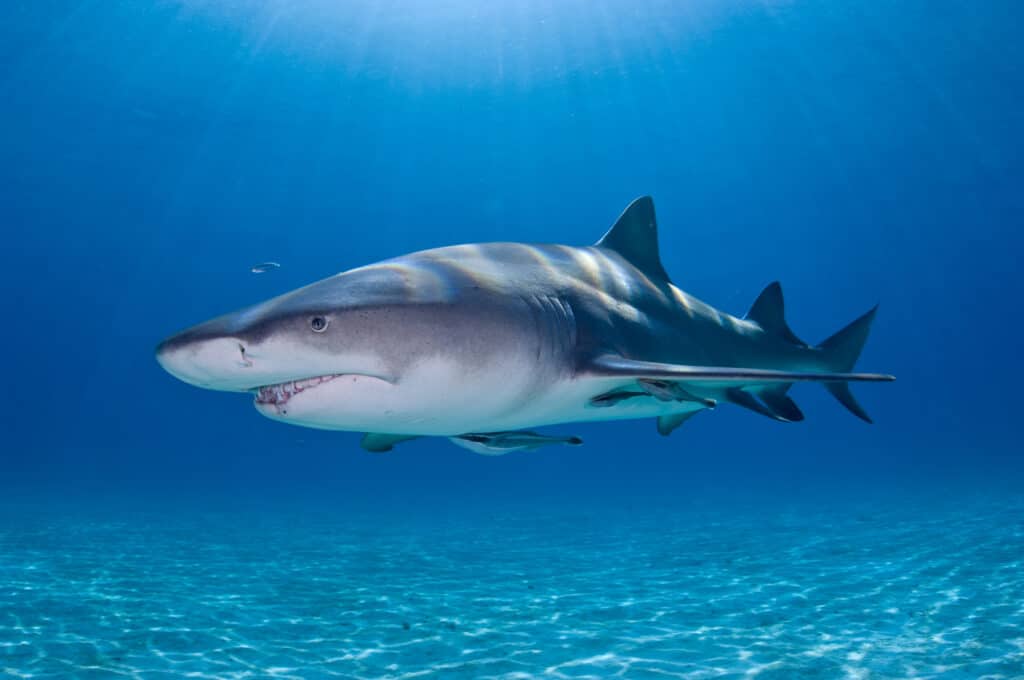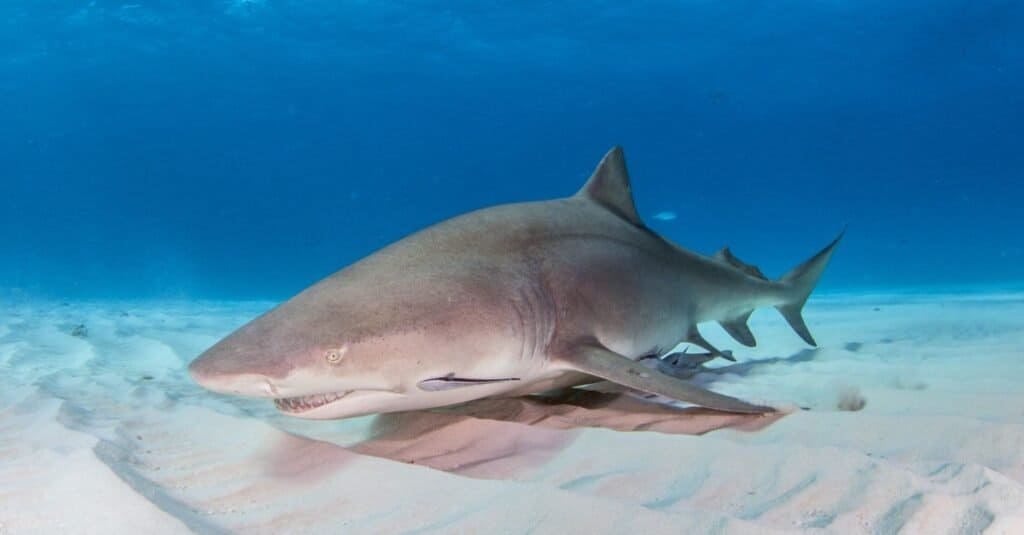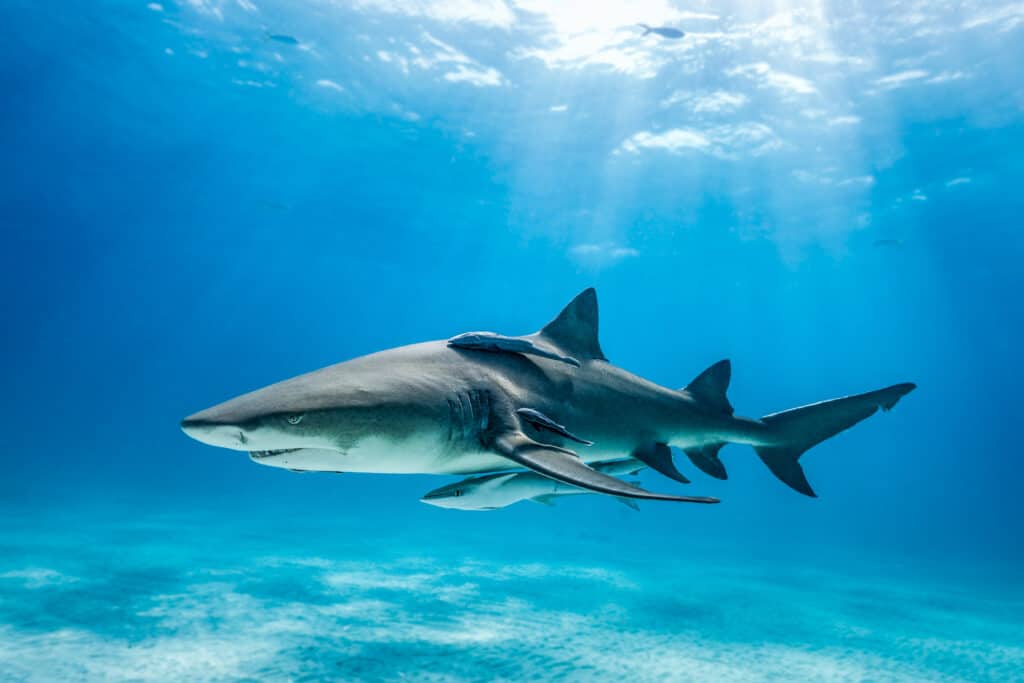Lemon sharks are 10-foot-long sharks found in tropical waters in North and South America. These sharks prefer warm water, which draws them to the coastal waters, as does the heavy presence of their prey. Humans also happen to love getting into these warm waters.
The farther from shore a swimmer gets, the higher their probability of encountering a lemon shark. Do these sharks love human flesh? Let’s find out if they are dangerous or aggressive.
Are Lemon Sharks Aggressive?

Despite their size and fierce looks, lemon sharks are not aggressive.
©iStock.com/uwimages
Lemon sharks are not aggressive sharks. Despite their large size and fierce looks, humans are not on their menu. That is a great win for humanity, given the size and power of these aquatic predators. These yellowish brown sharks typically grow between 8 to 10 feet long and can weigh up to 400 pounds. They can weigh heavier than an adult female bear.
Despite the peaceful nature of the lemon shark, they are capable of causing immense damage to humans. They have sharp teeth, are bigger, and are better swimmers underwater than humans.
Are Lemon Sharks Dangerous?

Generally not dangerous, a lemon shark may attack a human when defensive.
©Michael Bogner/Shutterstock.com
The lemon shark species are not harmful to humans and are relatively safe to encounter underwater. They sometimes circle divers harmlessly, without nibbling at or attacking them. Despite the peaceful nature of these large fish, it is advisable not to strike or attack them so as not to turn them defensive.
When defensive, a lemon shark may attack a human, sinking its long teeth into the person’s flesh. Like most shark teeth, theirs are sharp enough to pierce flesh. Though these large predators never bite to eat human flesh, their bites can leave scars and injuries.
Has A Lemon Shark Ever Attacked A Human?

Lemon sharks have accounted for 10 unprovoked shark attacks.
©iStock.com/Michael Geyer
According to the International Shark Attack File, there have been 10 unprovoked attacks on humans by the lemon shark, and none was fatal. These attacks happened in the Caribbean and Florida, and both places are known for their beautiful coastlines and large beach population. The more people inside the coastal waters, the more likely a shark attack is to happen.
Are Lemon Sharks Friendly?
Lemon sharks are naturally friendly animals, and these fish move together in groups and exhibit various social traits among their kind. Their social nature is believed to be a result of their brain size, which is relatively large compared to their total body size, unlike the giant basking shark.
Lemon sharks do not act so differently around humans, more curious than agitated towards divers. Due to their docile nature and size, they can be kept in aquariums. Some aquariums they can be found in are the Odysea Aquarium, National Marine Aquarium, and the Guadalajara Zoo in Mexico. In captivity, lemon sharks can live up to 27 years.
Lemon Shark Family
Lemon sharks belong to the Carcharhinidae family. Though lemon shark sightings are common on coastlines, most people don’t know that there are two sub-species of this shark species, both belonging to the Negaprion genus. The other shark, which is very similar to our lemon shark, is called the Sicklefin Lemon Shark. They are found in the Indo-Pacific.
Lemon sharks are also categorized as requiem sharks. The 60 species and 12 genera that belong to this class are migratory and give birth to live young. The lemon shark’s five-gill slits, single anal fin, and two dorsal fins also put the fish in the largest order of sharks, the Carcharhiniformes.
How Fast Are Lemon Sharks?
Sharks are one of the fastest fish species in the world, an adaptation that allows them to chase down their different prey in the ocean. However, lemon sharks do not rank among the fastest sharks worldwide, reaching maximum speeds of about 9mph (14.48kph). This slow speed makes them easier prey for larger sharks and fishermen than the shortfin mako shark, which can reach over 40mph (64.37kph).
What Do Lemon Sharks Eat?
Lemon sharks are nocturnal hunters that mostly go after fish. They have no specific favorites and would target whatever species are available in their area. Some of the fish they eat are bonyfish, parrotfish, and stingrays. Despite their preference for fish, lemon sharks have been known to shake up their diets a few times with crustaceans.
The yellowish color of the lemon shark is the perfect camouflage for these sharks when they are at the sandy bottoms of shallow waters. It protects them from bigger sharks and aids their stalking method of hunting prey. These aquatic hunters often go for slow-moving prey and jab forward repeatedly until they get their prey within their jaws. Then, they shake until they tear the flesh of their prey. Since lemon sharks are often in groups, this can cause a feeding frenzy.
Lemon Sharks Location: Where Can They Be Found?
Lemon sharks are migratory fish found in tropical waters and sometimes in the open ocean. They can also be found in rivers but never as far in as the bull shark can be found. Lemon sharks can be spotted along the Pacific and Atlantic Oceans coastlines.
According to the Florida Museum, lemon sharks can be found on the eastern coastlines of the United States, stretching along the Atlantic Ocean from New Jersey down to Brazil. Along the Pacific Ocean, these sharks can be found from the Gulf of California to Baja California in Mexico, and they can also be found in the Gulf of Mexico.
Lemon Sharks Predators
While humans fear sharks, humans are also predators of the cartilaginous fish species. Humans hunt sharks for several commercial reasons, including their meat. Weighing hundreds of pounds and with no bones, lemon sharks make a very rewarding catch. After thorough cleansing to get rid of the shark’s mercury and uric contents, they can be safely prepared and enjoyed.
As stated by the Florida Fish and Wildlife Conservation Commission, lemon sharks are illegal to hunt in Florida waters because they are vulnerable species. However, they are still hunted and had as delicacies when caught in United States Federal waters and the Caribbean. Other reasons these large sharks are hunted are for their fins and hides.
Up Next:
Are Great White Sharks Dangerous or Aggressive?
Lemon Shark Location: Where do lemon sharks live?
The 7 Most Aggressive Sharks in The World
Discover the largest lemon shark ever caught off Florida
The photo featured at the top of this post is © Greg Amptman/Shutterstock.com
Sources
- Florida Museum, Available here: https://www.floridamuseum.ufl.edu/discover-fish/species-profiles/negaprion-brevirostris/
- Oceana, Available here: https://oceana.org/marine-life/lemon-shark/
- Florida Museum, Available here: https://www.floridamuseum.ufl.edu/shark-attacks/maps/world-interactive/
- National Marine Aquarium, Available here: https://www.national-aquarium.co.uk/blog/toddler-blog-lemon-sharks/
Thank you for reading! Have some feedback for us? Contact the AZ Animals editorial team.







